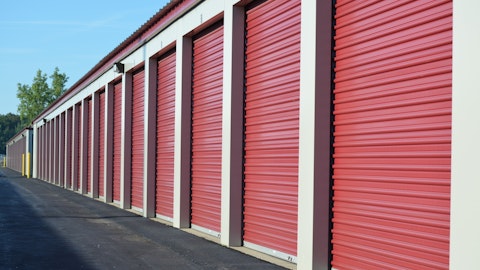Alex Gress: Sure. Yes. In ’23, just specifically on the payroll and benefits line, obviously, very good coming off of 2022, coming in lower year-over-year. But as Joe alluded, we really invest in our people and we really pride ourselves in customer service. So in ’23, payroll is up but nominally, certainly well below the pace of inflation. But it’s probably between that — around that 2.5% to 3.5% level. But if you look at ’24, we see that continuing to normalize, if not come down more for the exact reasons Joe outlined. It’s the continued investment in technology and specifically part of that is the continued rollout of our kiosk program that enables us to optimize hours at stores with lower physical count in the store and leveraging our call center operations.
Smedes Rose: Okay. And then, Joe, I just wanted to go back. When you said you had managed — owners of managed properties calling and saying that they would drop out if PSA took over, — what — I’m just — what’s the version? I mean, is it because they’re newer in that space? Or is it they don’t like the brand? Or what — like why would they do that?
Joseph Saffire: Smedes, I can’t comment as to why they choose decisions. I know that when we’re trying to win business, brand, people at the store and really your performance in their region, they want to choose an operator that is outperforming the others. That’s how their stores are going to perform. We invested in our people. We invested in our properties and they see how our stores are managed and they like that about us. I think there’s many options in the third-party business. It’s a very difficult business to win. We kind of got into it late in the game. But I think we’re really punching above our weight right now. We’re doing very well and we’re excited about the prospects going forward.
Operator: Your next question for today is coming from Mike Mueller at JPMorgan.
Mike Mueller: In terms of the redevelopments that you talked about completing over the past few years, the returns, can you talk about the size of that pipeline because there’s really nothing in the supplemental about it today. And what the pipeline could grow to over the next few years and just kind of marginal returns?
Joseph Saffire: Sure. I mean, obviously, with our acquisitions, Michael, we kind of continue to build up a pipeline. Every acquisition we do, we look at opportunities to expand or enhance, do a knockdown. But the pipeline — we have been targeting $60 million to $70 million a year in investment. We could do more. We could do $100 million. Sometimes there are constraints with municipalities and getting the appropriate approvals. Supply chain issue has been an issue but we think that’s getting a little bit better. So we — our guidance kind of includes $60 million to $70 million, ’23, ’24 million but we will do more if we can. We can get up to $100 million, $110 million. We have the capacity. We have our own construction team that just focuses on that. So a lot of it is in our control but some of it isn’t in our control and that’s supply chain and municipality speed. So our guidance, $60 million to $70 million a year but I think we’ll do better.
Mike Mueller: And what is the typical redevelopment or enhancement? And is it — and what portion of those tend to, I guess, have expansions tacked on to them as well?





